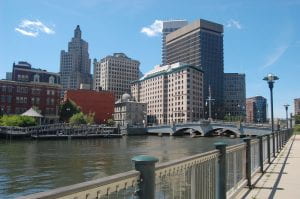Community Work-Study
Community Work Study allowed me to gain hands on experience connection to my major since my freshman year. These experiences and connections will help when when I look into applying to jobs and graduate school. Immersing myself in the Providence community was the best thing I could have ever done.
Isabella Masciarelli ’22

Community Work-Study is an opportunity for students with a federal work study award to work with our off-campus community partners and be paid through their federal work study funding. Students are able to gain real world work experience related to their interests or field of study while building a strong relationship with the surrounding community and serving as a resource to Providence College’s partner community organizations.
Frequently Asked Questions (FAQ)
What is Federal Work-Study?
The Federal Work-Study Program is a work program subsidized by the federal government. Eligible students receive a Work-Study Grant in their federal financial aid package annually:
- Awards for the upcoming academic year usually become available in the summer preceding an academic year.
- Students interested in beginning work in July will apply online and interview in June.
- Students interested in beginning work in September will apply and interview in August or September. The position will not be formally available until late August.
A Work-Study Grant is not a guaranteed scholarship. A student can earn up to, but not exceed, the maximum award amount found in their award package by working on an hourly basis over the course of one year (July 1st through May 15th). S/he must still apply for available positions, and is only paid if hired and for those hours actually worked.
What is Community Work-Study (CWS)?
Community Work-Study is often called “Off Campus Work Study.” CWS is paid community service work that students perform at local partner service organizations. Like regular work-study, students are paid through Providence College (not the service site).
The Feinstein Institute aims to strengthen relationships between Providence College and the surrounding community through CWS site partnerships. Some CWS placement sites are already “core partners” of the Feinstein Institute. Students from service-learning courses may regularly volunteer at core partner organizations alongside the CWS student(s). This overlap allows for strong, long term relationships with local organizations in the community
What are the benefits to students?
Students can:
Apply and challenge classroom learning in a “real-world” environment.
Contribute to local service organizations and learn about diverse communities and current political, social, and economic climates in the greater Providence area.
Build relationships with colleagues, supervisors, and mentors who may guide students as they explore your professional interests and develop a professional network.
Earn an above-minimum wage of $12.25/hour to help offset the cost of college. Students may work up to 20 hours/week while school is in session and up to 40 hours/week during school breaks.
Develop professional skills while explore meaningful work and work environments.
Where can students work?
The Feinstein Institute maintains contracts with sites. To respect and strengthen existing partnerships, students may not create their own placement sites. A list of available CWS sites is available on the Community Partners & Open Positions page.
Categories of “Community Service Work” include:
Social Justice and Advocacy: Civic engagement and government, advocacy or legislative efforts, and building resources within undeserved populations, i.e., workers’ rights.
Schools: Literacy training, tutorial service, support services to teachers and administrative staff.
Youth and Community Development: Child care, mentoring, transportation, public safety, crime prevention and control, library programming, and recreational activities.
Healthcare: Hospitals, clinics, help lines, and health-based social services.
How much can I work? How do I balance my schoolwork?
It is up to the student and his/her site supervisor to set a schedule that fits the needs of the site and the schedule of the student. It is the student’s responsibility to make sure s/he does not work more than his/her work-study award allows. The student will not get paid for any hours worked once that maximum amount reached.
Consider:
Students can work up to a maximum of 20 hours per week when classes are in session and 40 hours per week during school breaks.
Which site is right for me?
Does the site offer opportunities to explore my career and service interests?
Could the site utilize a Work-Study student during the days and hours that I am available?
Am I interested in working through school vacations to increase my hours? Is the site able to provide enough work for me during those times?
Do I have reliable transportation? How long does it take to travel to and from each site?
What paperwork is required to get hired?
View the required paperwork listed on the Financial Aid site to find out what forms are required to get hired for CWS.
Feinstein Institute for Public Service
Feinstein Academic Center 402
401.865.2786
401.865.1206
fips@providence.edu





